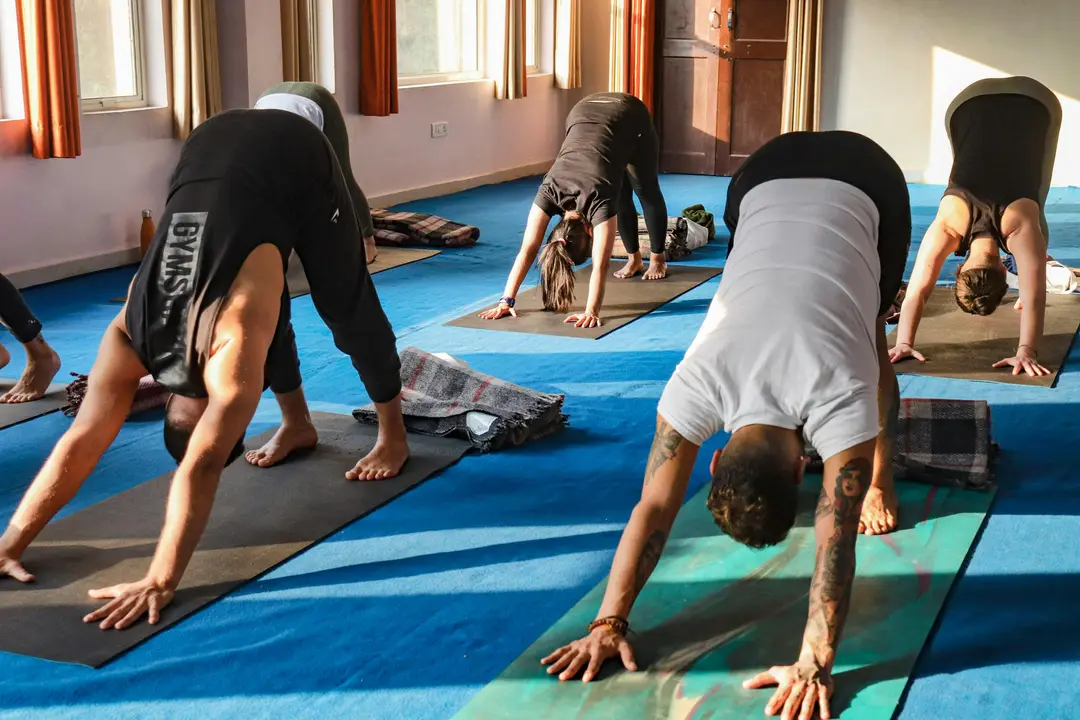Advance Your Practice. Join Our 300 Hour Hybrid Yoga Teacher Training Thailand for Mastery and Expertise
Integrate Advanced Techniques with Flexible Learning to Elevate Your Yoga Teaching Career

300 Hour Hybrid Yoga Teacher Training Thailand
Join Us in beautiful locations: Chiang Mai, Koh Samui, Koh Yao Noi.
Upcoming Courses From October
Program Overview
Embark on a profound journey with Advait Yoga’s 300 Hour Hybrid Yoga Teacher Training in Thailand. This advanced program is designed for dedicated practitioners who wish to deepen their yoga practice and enhance their teaching skills. Our hybrid format combines the convenience of online study with the immersive experience of onsite training, offering a comprehensive and enriching approach to advanced Yoga education.
Our 300 Hour Hybrid Yoga Teacher Training Thailand provides an extensive curriculum that includes advanced Asana practice and teaching, Alignment, Yoga Philosophy, Pranayama, Mudras, Bandhas, Meditation, Shatkriyas, Chakras, Anatomy, Physiology, and Kundalini awakening. This program is tailored to refine your practice, deepen your understanding, and enhance your ability to teach with confidence and expertise.
300 Hour Hybrid Yoga Teacher Training Thailand Accommodation Fee
1 People Single Room
Early Bird Price
- 10% discount if booked 30 Days in advance
Includes
- 17 Nights Accommodation, 15 Day Onsite Training, Vegan Vegetarian Breakfast, Manual and Study, Material, Asana, pranayama, bandha, and mudra, Shat Kriyas, mantra chanting, Yoga philosophy, anatomy, and physiology, Multi-style meditations, 300-Hour Teacher Training Certificate
2 People Twin Sharing Room
Early Bird Price
- 10% discount if booked 30 Days in advance
Includes
- 17 Nights Accommodation, 15 Day, Onsite Training, Vegan Vegetarian Breakfast, Manual and Study, Material, Asana, pranayama, bandha, and mudra, Shat Kriyas, mantra chanting, Yoga philosophy, anatomy, and physiology, Multi-style meditations, 300-Hour Teacher Training Certificate
Accommodation In Thailand

Koh Samui
Krisada Resort amravati accommodation offers guests a tranquil, rejuvenating, home away from home experience.
Upcoming Dates
3-2-2025

Chiang Mai
Island Yoga accommodation offers guests a tranquil, rejuvenating, home away from home experience.
Upcoming Dates
3-2-2025

Koh Yao Noi
Amravati Wellness accommodation offers guests a tranquil, rejuvenating, home away from home experience.
Upcoming Dates
3-2-2025
Upcoming Training Dates In Thailand
Koh Samui
Coming Soon!
Koh Yao Noi
10 – 27 November
1 – 18 December
Chiang Mai
16 Feb to 5 Mar 2025
27 Oct – 13 Nov 2025
Testimonials
“I would always come back because of the exceptional team of teachers, the lovely beach, and the super healthy, delicious vegetarian food. What an unforgettable experience!”
“I am pleased that I chose Advait Yoga for my 300 hour hybrid yoga teacher training. The teachers have a very heartful and humble approach to teaching. I feel lucky to have experienced teachers who shared their knowledge with us. The food was great! They are very cheerful and helpful. I also love that we had Indian yoga teachers. Thank You for everything! Much good luck to you!”
Frequently Asked Questions
What is the difference between the 200-Hour and 300-Hour Hybrid Yoga Teacher Training?
The 300-Hour training is an advanced course designed for those who have already completed a 200-Hour certification. It delves deeper into advanced asanas, teaching techniques, anatomy, and yoga philosophy.
How is the hybrid structure of this course organized?
The course is divided into online modules, focusing on advanced theoretical content, and an in-person intensive in Thailand, where you will refine your skills, practice teaching, and immerse in advanced yoga practices.
Who is eligible to enroll in the 300-Hour program?
This course is open to certified yoga teachers who have completed a 200-Hour Yoga Teacher Training and wish to advance their practice and teaching skills.
How long does the online portion of the course take?
The online portion can typically be completed within 8-10 weeks, depending on your pace. It includes in-depth lectures, readings, and assignments that you can complete at your own speed.
What will I learn during the in-person training in Thailand?
The in-person training covers advanced asana practice, in-depth anatomy, teaching methodologies, sequencing, adjustments, and workshops on yoga philosophy and ethics. You’ll also engage in practice teaching sessions
Is accommodation provided during the in-person training?
Yes, accommodation is included in the course fee. You’ll stay in comfortable, shared rooms close to the training center, surrounded by nature to enhance your learning experience.
Are meals provided during the in-person segment?
Yes, healthy vegetarian Breakfast and Lunch are provided daily during the in-person training. We cater to special dietary needs upon request.
How much does the 300-Hour course cost?
The course fee includes the online modules, in-person training, accommodation, and meals during the in-person segment. Please visit our website for the most up-to-date pricing.
What should I bring to the in-person training?
Bring comfortable yoga attire, a journal, a water bottle, and any personal items you may need. Yoga mats and props will be provided, though you are welcome to bring your own.
Is the online portion self-paced?
Yes, the online portion is designed to be flexible and self-paced, allowing you to progress through the material according to your schedule.
